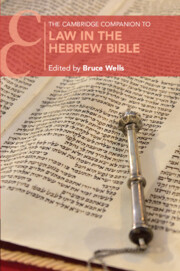Book contents
- The Cambridge Companion to Law in the Hebrew Bible
- Cambridge Companions to Religion
- The Cambridge Companion to Law in the Hebrew Bible
- Copyright page
- Contents
- Contributors
- Abbreviations
- Introduction
- Part I The Historical Context of Biblical Law
- Part II The Biblical Legal Collections
- Part III The Biblical Laws
- 6 Substantive Law
- 7 Procedural Law
- 8 Ritual Law
- Part IV Biblical Law and Other Scriptural Discourses
- Part V The Legacy of Biblical Law
- Bibliography
- Subject Index
- Text Index
- Cambridge Companions To Religion (continued from page iii)
- References
6 - Substantive Law
from Part III - The Biblical Laws
Published online by Cambridge University Press: 11 April 2024
- The Cambridge Companion to Law in the Hebrew Bible
- Cambridge Companions to Religion
- The Cambridge Companion to Law in the Hebrew Bible
- Copyright page
- Contents
- Contributors
- Abbreviations
- Introduction
- Part I The Historical Context of Biblical Law
- Part II The Biblical Legal Collections
- Part III The Biblical Laws
- 6 Substantive Law
- 7 Procedural Law
- 8 Ritual Law
- Part IV Biblical Law and Other Scriptural Discourses
- Part V The Legacy of Biblical Law
- Bibliography
- Subject Index
- Text Index
- Cambridge Companions To Religion (continued from page iii)
- References
Summary
This chapter describes the legal topics treated in the biblical collections – topics that legal historians would use in their work. They include personal status, family law, property, contract, and harms.
- Type
- Chapter
- Information
- The Cambridge Companion to Law in the Hebrew Bible , pp. 117 - 137Publisher: Cambridge University PressPrint publication year: 2024



